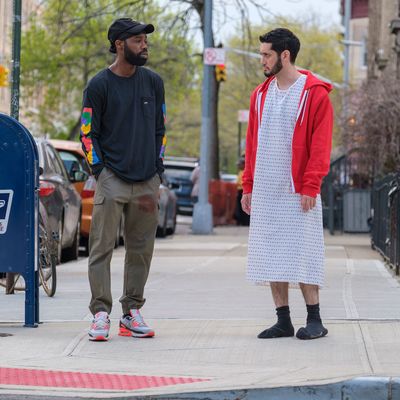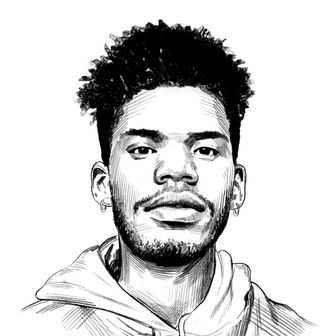
Flatbush Misdemeanors returns to Showtime this weekend for a second season. It’s created by co-stars Kevin Iso and Dan Perlman, who play best friends tryna make it in the title’s neighborhood. Dan Joseph, a teacher, struggles with substance abuse and a kooky homelife that’s left him straight-backed and wounded; Kev is a visual artist who just can’t seem to gather the motivation to take a leap in his artistry. Perlman sat down with Dinner Party earlier this week to chat about his changing relationship with the city and what it means to play a character that’s pretty similar to his real life. You can watch the first season’s first episode right here.
Flatbush Misdemeanors is so much about forming relationships, calcifying and deepening them, and not just between characters but between yourselves and the city. I wondered about your relationship to the city and whether it’s changed at all since the release of the first season?
I’m from New York, and I live in Flatbush now, but I’m not born here. I would guess some people were understandably like, What are these guys gonna do? How are they gonna portray it? Because we’ve seen so many portrayals of not just neighborhoods but, you know, that are like from an outsider perspective and are insulting in their ignorance and their lack of research. So it was super-important to write characters that were three-dimensional and to have people in front of and behind the camera that could speak to all of the lived experiences. So it’s not just two dudes thinking they know the experience of a Black teenage girl, which we do not and could not. So people in the neighborhood, in the city, feeling like it was a good, funny, cool, representation? That means a lot. ’Cause you know how quick New York will be able to say that they hate something if they hate it.
Right!
There’s no mincing words. There’s no Midwest politeness or southern hospitality. If they think it sucks, they’re gonna fucking tell you. No etiquette there.
Do performers have a hand in writing the jokes, or at least coming up with jokes, while you’re shooting or something?
I mean it’s more scripted than people might think. We have it pretty carefully written out, but that said, there is always room for that. I love when that happens. ’Cause so much of the time, you’re writing a thing — and this goes for stand-up: You say it onstage, and you’re like, Well, that doesn’t sound right. And then you fix it. And so the same with the script: You hear somebody else say it, and you’re like, Well, that sounds wrong. Let’s not do that. The benefit of season two is we have more of a working relationship and build much more trust with the whole cast.
I wondered with something that feels this real, and where like you’re using your name, is there ever a blur between reality and fiction for other people who are talking to you? Are people on the street in New York being like, “Yo, you got some Xannies?”
I can’t fuckin’ —
Like “What’s up?”
People have come to like stand-up shows and stuff and come after and be like, “No, you gotta stop all that Xanax.” I’m like, “No, the real me did years ago!” There’s a bit of a blur there, like, the guy’s name is Dan Joseph, which is my middle name. This is like a fraction of my name, and this is a fraction of me. This is a worse version of me. This is me without … without comedy, without any of my shit together, just sleepwalking through young adulthood.
The transition from being talent into someone who’s running the show. Was there any pressure around that?
A thing that I felt stressed about initially is like, I don’t know about a lot of stuff. Like if somebody asks a question about production design, I’m like, I don’t know, like I’ve just been shooting in my apartment. I don’t know what to say about this or that. Can we afford a basketball? A lot of my friends studied film, but I studied education. It’s okay to not know certain things, if you can just express, like, this is the emotion we’re looking for. This is the feel. And then you’re lucky to have people who are great at what they do. And that gives you one less thing to worry about.
Was there a different approach this season than the first one? Just because dealing with characters who we know a little bit more about. How’d you go into it?
Well there was a a little bit of turnover in terms of people behind the camera. So when you bring in new people, you get new voices and you get new ideas and perspectives, which is always good and valued. For me, the most fun thing is when the characters can weave together. It’s always like, “Let’s find new ways to to be in new environments for the characters while also finding ways to still interconnect them.” So it’s like, okay, we have Dan in Narcotics Anonymous this season. How do we weave that into the story of Drew, into the story of Kevin, Zayna? For me, it’s like when I’m watching a comedy, I just wanna see the characters together. I don’t really care why. I just wanna see them ping-pong off each other and have fun there. That’s the most fun way to do that. So that’s the challenge also in writing of how do we find it in a way that’s organic and advances each of their wants and needs and not just what they wanna have happen, but what they need to have happen for their own growth. So we have new environments, you know, there’s the bike shop now and there’s NA and Kevin’s in an art fellowship. And so I think that’s a cool way to keep it refreshing, as they’re in these different trial stages of their life and, you know, failing at all of them.
So obviously you’re in Flatbush. You know, there’s a lot of Black and brown people there. How’s it feel being an icon of the Black and brown communities?
I — I’m not answering that. I would feel like such an asshole.
I just had to see ’cuz, you know, some people walk around and be like, I’m that boy now? Like, I can go to any bodega.
I’ll tell you my favorite story of being recognized in the neighborhood. I was taking a walk with a friend in Prospect Park, and we were walking out and there was a florist. She was like, “Are you Dan from Flatbush?” And I was like, “Yeah.” And she was like, “I love this show.” And I was like, “Oh, thanks so much.” And then my friend, she saw her unloading flowers from a truck, and she was like, “Do you need some help?” And I was like, “Don’t do that.” She’s not from New York! She just offered help to somebody, which you don’t do. She was like, actually, “Yeah.” She points like halfway down the block. “Can you carry that down and then make a right and then go in there up the vestibule? It’s for a wedding. So if you could just like carry it up the stairs or whatever.” And so I’m like, “Okay,” so I’m carrying it with my friend, and she was like, “We could just set it down.” I was like, “We can’t set it down because she recognized me. She’s gonna be like, ‘I met that guy — he was a dick! And he just fucked me over!’” I was like, If she wants me to work the whole wedding, I just have to now.
Like, Oh, this is a job now.
I’m on shift right now. Yeah. But I love that energy of New York where it’s like, “Hey, I know you. I like your stuff. Can you help me move my couch up a three-floor walk-up?” It’s so New York: I like what you do, but I also don’t really respect you in any real way. That feels like where it should be.
I like that. You can’t get too big in New York. Like it’s impossible.
And that’s how it should be. It’s like, “Oh, you’re on that billboard, right?” “Yeah.” “Could you actually help me? I’m trying to fucking move.”





